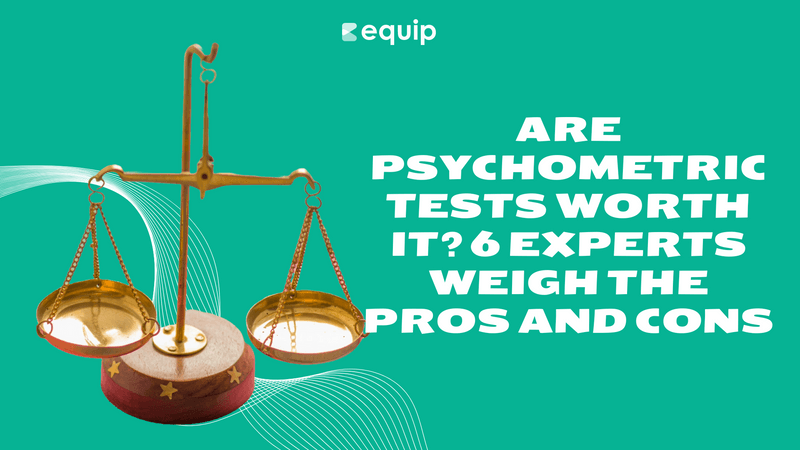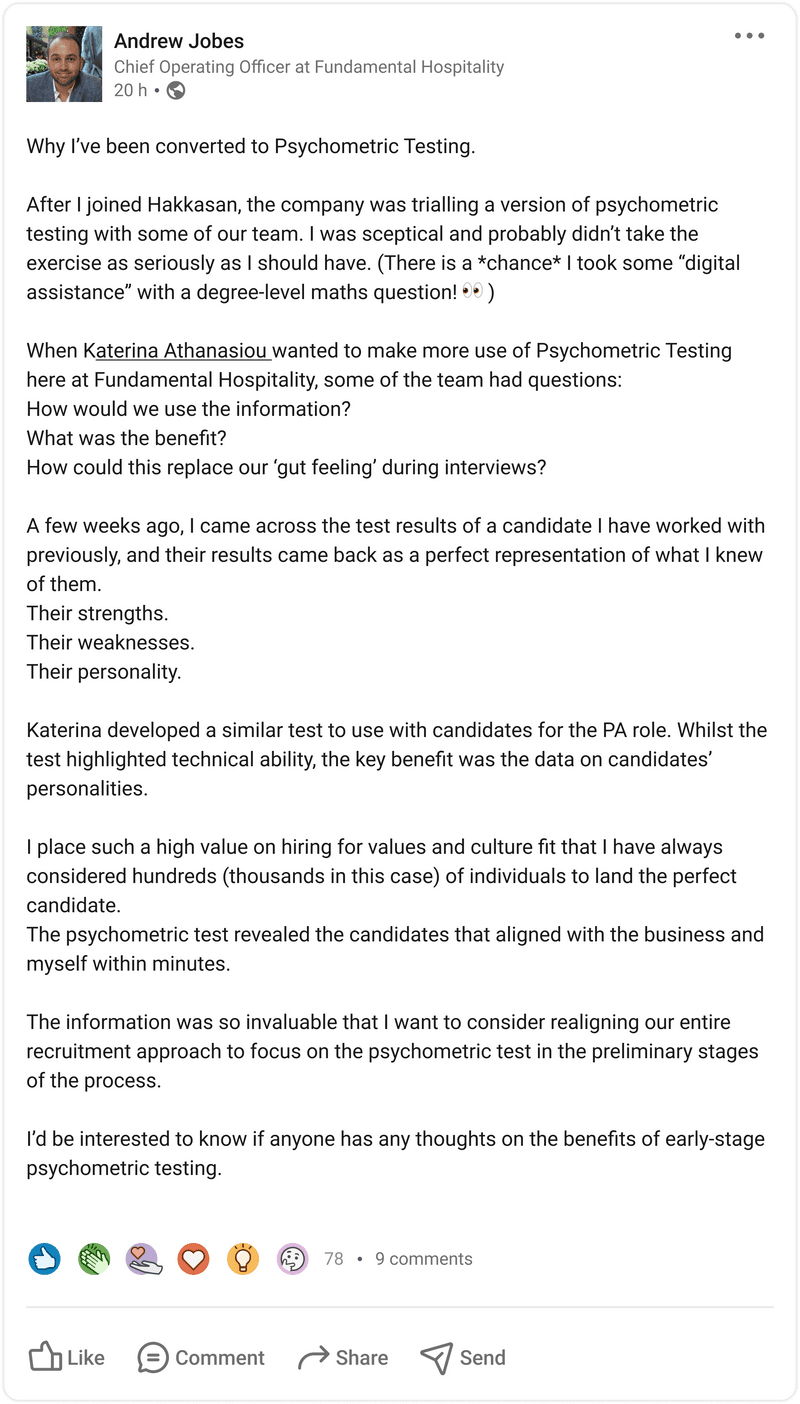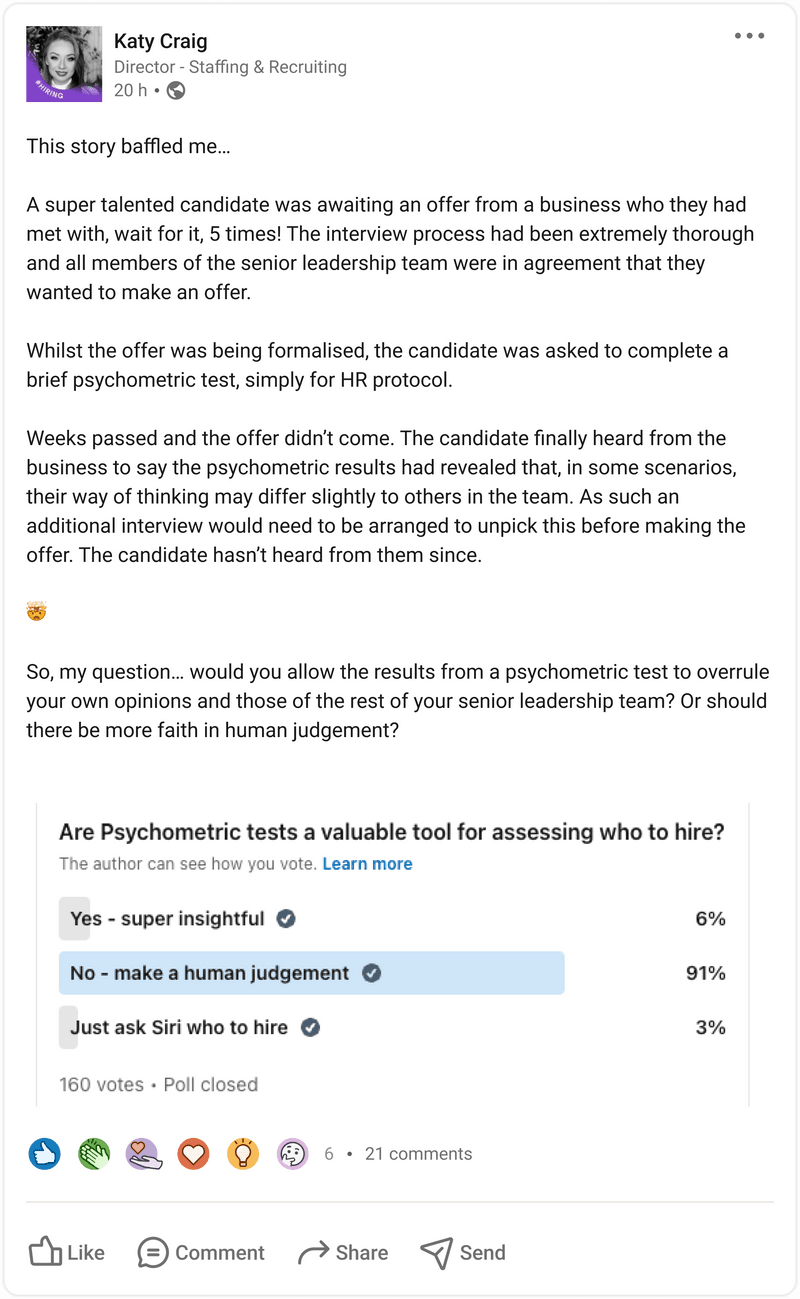
Psychometric tests in recruitment are a controversial topic for some HR leaders. Some swear by the efficacy of psychometric tests to find the best-fit hire.

Others see psychometric tests as a gimmicky way to reject otherwise well-qualified candidates.

Psychometric tests – which measure various psychological skills and traits to assess an individual’s capabilities – can have varying levels of efficacy and predictability for job success based on the roles you’re hiring for and organizational needs.
Despite their controversy, experts estimate that as many as 60 percent of workers are now asked to take workplace assessments, according to SHRM.
Also read: What is a psychometric test for recruitment?
But before you integrate psychometric tests for your recruitment process, it’s essential to weigh the pros and cons of psychometric tests in recruitment.
Pros of Psychometric Tests
1. Measures all candidates equally
Typically, recruiters send psychometric tests to compare a group of candidates and t decide who should advance to the next interview round or identify a best-fit hire among a few top candidates.
Because all candidates take the same test with the same set of questions, psychometric tests allow recruiters to look at the candidate pool on an equal playing field and provide a standardized way to measure abilities. For example, a Big 5 personality test will ask all candidates the same questions to assess openness, conscientiousness, and more.
However, remember that doesn’t mean psychometric tests are free from bias or give all candidates equal opportunity. Depending on the type of test, there can still be plenty of room for bias that recruiters need to be on the lookout for.
2. Saves time for recruiters
Psychometric tests are quick and easy for recruiters to send to candidates, and psychometric assessments are asynchronous, meaning no human involvement is needed.
Interviewing candidates is no small – or quick – feat.
Consider this: Recruiters spend an average 20-40 minutes per candidate per interview during the recruitment process, according to Stratus HR.
With psychometric tests, bad-fit hires can be identified before the advance to the interview round, meaning recruiters have a smaller and more qualified pool of candidates to interview.
3. Helps introverted candidates show skills
Not everyone excels at face-to-face interviews, but these candidates may still have all the skills and qualifications needed to succeed in their role.
Psychometric tests during the recruiting process can help a candidate show off their skills in an environment that’s more comfortable for them, without the added stress and anxiety of an interview. This can also help reduce bias or judgment based on how a candidate presents in an interview and focus on the skills necessary for the role.
4. Psychometric tests have uses beyond recruitment
Psychometric tests are primarily used during the hiring process, but their use doesn’t end there. The results of the psychometric tests can allow a new hire to be themself and easily settle into their new role without having to “prove” that they have the skills and competencies to succeed.
The results of psychometric tests can reveal a new hire’s leadership style, learning preferences, and personality traits, which can all inform how you onboard and develop the employee.
They can even help set objectives for a new hire’s 30-60-90 day plan by pinpointing strengths and weaknesses
Cons of Psychometric Tests
1. Lack of context and incomplete candidate profile
Psychometric tests in recruitment only show small parts of a whole candidate.
While they can give valuable insights, they don’t take the entire candidate into account, meaning that there may be essential candidate information or context that you’re overlooking.
“Have you ever tried fitting a square peg into a round hole? “Well, that's what psychometric tests feel like – trying to jam complex human personalities into multiple-choice questions,” says HR leader Katherine Watkins.
Just relying on psychometric tests to choose who moves forward during the recruiting process can mean looking over well-qualified, best-fit hires who didn’t do as well during a certain assessment.
Some HR leaders and experts think that psychometric tests are too generalized.
“Different roles command different skills and competencies,” said HR leader Richa Gandhi. “A generic test may not assess the specific requirements of a particular job accurately.”
2. Potential for bias
Like many other parts of the recruiting process, psychometric assessments for recruitment have a significant potential for bias – and can even lead to discrimination claims from candidates.
“Psychometric tests are discriminatory by their very premise,” says founder and advisor Kelly Bron Johnson. “Any company that uses them is not working by the principles of inclusion and diversity.”
Depending on what type of psychometric test you’re using and your target talent pool, answers may be skewed more toward one culture’s customs, or tests may have a language barrier that stops different candidates from applying.
For example, some aptitude tests can be especially difficult for neurodivergent candidates, such as those with ADHD or autism, and lead to candidate frustration.
“Job application ‘personality tests’ seem to be very ableist, especially for those of us with ADHD,” one Reddit user said.
In fact, two recent cases involving discrimination against autistic candidates in psychometric testing were won by the candidates.
3. Candidate frustration and drop-off
Although these tests can make things easier on recruiters, it can be a dreaded headache for candidates. Assessments are often long and complicated – up to 93 questions for the MBTI and 185 for the 16 PF, and up to 90 minutes to complete for some assessments.
According to a 2018 study from Hays, 73% of candidates will drop out of an application if the process takes too long, so it’s more important than ever to make sure your application process is as seamless as possible.
However, it’s important to note that poorer-performing candidates are more likely to self-select out of assessments than better-qualified candidates, according to a 2019 study. Regardless of industry, assessment design, or assessment content, the research found that lower-quality candidates consistently dropped out of assessments before completing them more often than higher-quality candidates.
4. Unreliable assessments
There’s no shortage of online psychometrics tests to choose from – but that’s not always a good thing. The overwhelming amount of tests means that many can be unreliable and untrustworthy, leading to inaccurate results and more work for recruiters.
For a reliable prehire assessment, check out the variety of tests that Equip has to offer, including the ability to add your own questions using custom tests.
How to decide if psychometric tests are right for your organization
You now know the pros and cons of psychometric tests, but the question still stands: Are they right for you?
Of course, we can’t answer that for you. It’s dependent on your specific business needs and recruiting process. However, while they can give you valuable information, psychometric tests should never be the be-all and end-all of your hiring decision.
If you decide to implement psychometric testing as part of the hiring process, it’s important to take steps to make sure it’s done accurately and effectively.
Best practices
Here are some best practices to keep in mind when using psychometric tests for hiring.
- Keep legal and ethical concerns in mind at all times, and take steps to avoid these concerns when possible.
- Use the test as only one piece of the hiring puzzle. Think holistically about the candidate when hiring instead of focusing only on psychometric data and on-paper qualifications.
- Help give context to candidates about why a psychometric test is used and what value it adds to avoid candidate frustration.
- Encourage applicants to ask for accommodations where necessary to avoid bias and give all candidates equal footing.
- Choose a mobile-friendly test to avoid candidate drop-off, since 86% of active candidates use their smartphones to begin a job search.
- Make the process more enjoyable by selecting engaging tests that will hold candidates’ attention.
Have you also wondered...
What is the difference between psychometric tests and personality tests?
Psychometric tests measure an individual's cognitive abilities and aptitudes, providing insights into their mental capabilities and problem-solving skills. Personality tests, on the other hand, assess an individual's character traits, behaviors, and emotional patterns, helping to understand how they interact with others and respond to various situations. While psychometric tests focus on skills and intelligence, personality tests delve into the nuances of one's character and temperament.
Are personality tests a subset of psychometric tests?
Yes, personality tests are a subset of psychometric tests. Psychometric tests include a broad range of assessments designed to measure cognitive abilities, aptitudes, and psychological traits, such as intelligence tests (e.g., IQ tests) and skills assessments. Personality tests, which fall under this broader category, specifically focus on evaluating individual character traits, behaviors, and emotional patterns, with examples like the Myers-Briggs Type Indicator (MBTI) and the Big Five Personality Test.
